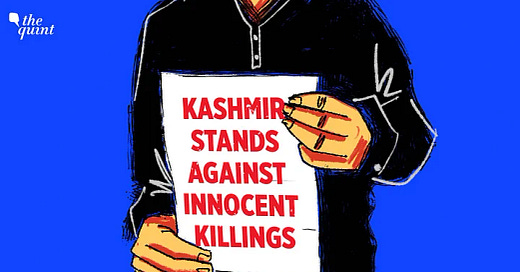The Question is… Where Does the Pahalgam Attack Leave Kashmiris?
We bring you credible information ONLY. Become a member and support us!
Dear Reader,
“I am not crying only for my son. I am crying for all the Hindustanis who have died in this tragedy.”
Khalida, the bereaved aunt of Adil Hussain Shah, the lone Kashmiri victim of the Pahalgam attack, expressed the collective sorrow of many in Kashmir when she spoke to The Quint a day after tragedy struck the region.
Hours after the attack, hundreds of Kashmiris came out of their homes in solidarity. Many gathered outside the Anantnag hospital, ready to donate blood, after having rescued the injured. Many others protested and condemned the massacre in the strongest possible terms.
A day later, for the first time in 35 years, a complete shutdown was observed. As an eerie silence now prevails in Pahalgam, and the rest of Kashmir, one wonders:
How will the attack impact the lives of Kashmiris?
As grief hangs heavy over Kashmiris, so does the weight of their future. For one, tourism, which had shown unprecedented growth in recent years, has collapsed overnight. In 2022, the region saw 1.62 crore tourists, the highest in 75 years. In 2024, it hit another record when it touched 2.36 crore. The numbers are now undoubtedly going to be bleak in 2025.
"Everything has come crashing down," a Kashmiri taxi driver told The Quint. Even as locals, hoteliers, and tour operators helped the stranded tourists evacuate, they probably know they won't be back anytime soon.
All of this unfolds even as the loss and grief from the attack run deep.
The loss and grief of a Kanpur family who returned home from Pahalgam with their newlywed son's body. The inexplicable sorrow of the wife of Indian Navy officer Lt Vinay Narwal, who died in the same week of his wedding. The grief of Adil's family, who depended on him for their livelihood, but who lost his life trying to disarm a terrorist.
Since the abrogation of Article 370 in Kashmir, New Delhi has repeatedly emphasised the narrative of peace in the region.
Despite the enduring grief, the question is... why did Pakistan provoke?
And can General Asim Munir's speech to Pakistanis abroad be connected to the attack?
My colleague Aditya Menon tries to find an answer to the latter by delving deep into the Pakistan Army Chief's domestic political challenges and backstory.
Meanwhile, calling it a “calculated escalation”, senior journalist Harinder Baweja argues in her column 'Tipping Point' that the Pahalgam attack aligns with Pakistan's pattern of trying to internationalise the Kashmir issue by timing it with US Vice President JD Vance's visit.
Former diplomat Vivek Katju explains how the attack indeed "overshadowed" Vance's India sojourn, but it also reveals a significant aspect of India-US relations.
At The Quint, we are all hands-on-deck to bring you the most comprehensive coverage of this unfolding tragedy — and find answers with the help of the best experts in defence, international affairs, and politics. Stay tuned for more deep dives and ground reports.
Before I sign out, one request — our newsroom, even when news breaks faster than we can keep up, wants to ensure we bring you credible information ONLY. It's easy to get distracted from the noise on the internet, fall for fake news, and be influenced by narratives. Our intention, and goal, at The Quint is to inform and engage, especially as the nation grapples with such a tragedy.
If you like what we do, please support us. Consider becoming a member*.
At the same time, we are listening. Please write to us with any feedback so that we can do better. You can reach out to us at editor@thequint.com.
Thank you,
SHELLY WALIA
Executive Editor
Also Read:
*Already a member of The Quint? What a star! Your support empowers us to question everything.
Want us to cover a story? Write to us at editor@thequint.com or reply to this email.




